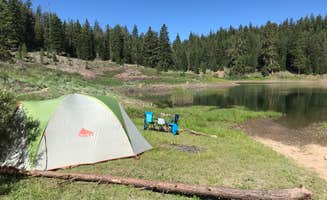Tent camping near McArthur, California offers options in the high-elevation northeastern region of the state where summer temperatures typically range from 45-85°F with significant overnight cooling. Most campsites sit between 4,000-5,000 feet elevation in juniper and pine forest terrain. Winter brings snow closure to many of these remote sites, limiting access primarily to May through October.
What to do
Fishing opportunities: Eagle Lake tui chub and rainbow trout are common catches at Rocky Point West, where the shoreline access provides good casting spots. "BLM land by water is relatively flat" and "it is a BEAUTIFUL area and drive in," according to camper Jules S.
Stargazing sessions: The minimal light pollution at Cave Lake Campground creates exceptional night sky viewing conditions. "Stargazing was absolutely breathtaking," reports Carolyn P., who found it to be "one of our very favorite sites just over the Oregon-California border."
Hammock relaxation: The forested setting at Cal Pines provides ideal hammock setup options between trees. Cameron W. notes, "I really enjoyed my time setting up a hammock and enjoying the scenery. There was plenty of shade and a nice breeze in the afternoon that I looked forward to."
What campers like
Lakeside tent spots: Setting up directly next to water is possible at several McArthur area tent camping locations. At Cave Lake Campground, campers appreciate the proximity to swimming opportunities. Carolyn P. shares that sites are "equipped with fire pits and picnic tables" and that she "camped directly next to lake."
Weekday solitude: The remote nature of tent camping near McArthur means significantly fewer visitors during weekdays. "Totally isolated (during the week)" is how one camper described Cave Lake, with "stunning views of surrounding mountains and forest with a crystal clear lake for swimming and fishing."
Simple facilities: Rocky Point Dispersed Camping provides basic but functional amenities for tent campers seeking a no-frills experience. Tom P. notes there are "signs acknowledging it's free camping" with a "large barren area with a toilet near the lake" and "lake view."
What you should know
Vehicle requirements: High-clearance vehicles with 4WD/AWD are essential for accessing many McArthur area tent sites. Cave Lake Campground demands particular caution as it has a "very steep, high grade road that is mostly dirt and large rocks." One visitor warns, "We popped a tire in our SUV on the way up, but totally worth it."
Insect considerations: Mosquitos can be particularly problematic at sunset in water-adjacent camping areas. At Rocky Point West, Jules S. reports that "mosquitos are horrible. Sitting outside during sunset isn't even possible with bug repellent. They were covering my dogs."
Communication limitations: No cell service exists at most tent camping locations near McArthur. Jules S. specifically mentions "also no cell service" at Rocky Point West, making advance planning and emergency preparedness essential for tent campers.
Tips for camping with families
Easy hiking options: Rainbow Pond at Cal Pines provides a gentle walking destination suitable for children of various ages. Cameron W. mentions, "Rainbow pond was a great place to walk to from the campground" and is within reasonable distance for family outings.
Swimming access: Clear, shallow entry points at Cave Lake provide safer swimming for families with children. "Crystal clear lake for swimming and fishing" makes this a good option for families seeking water activities during summer months.
Site selection strategy: When tent camping with families at Rattlesnake Creek Bluff, select sites further from the creek during spring runoff when water levels are higher. The walk-in tent sites require carrying gear a short distance but offer more separation from other campers.
Tips from RVers
Length limitations: The narrow access roads at many McArthur area camping spots restrict larger recreational vehicles. At Rocky Point West, Jules warns it is "NOT big rig friendly. It is a sharp, steep curve to come into gate and road is narrow gravel/sand. I would not have been able to get into area and turn around if my rv had been any longer that it is (19ft)."
Traction assistance: Pack traction devices for sandy or muddy conditions at dispersed sites. "I had to use 4WD and Maxtraxs" at Rocky Point West, according to Jules S., who encountered challenging terrain even with a smaller RV.
Turn-around considerations: Scout ahead for RV maneuvering space as designated turnarounds are often absent. "Road just ends so you have to turn around in grass/rock terrain if you go too far because there is no warning" at Rocky Point West, creating potential difficulties for larger vehicles.


